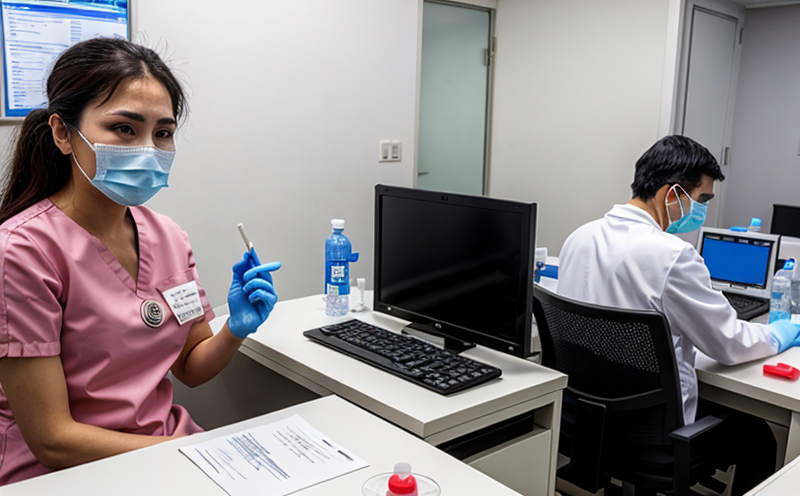Tick-Borne Encephalitis Virus Serological Testing in Wildlife
The Tick-Borne Encephalitis (TBE) virus is a member of the flavivirus genus and represents a significant public health concern. This virus can be transmitted to humans through the bite of infected ticks, primarily Ixodes persulcatus or other tick species found in forested areas across Europe and Asia. The serological testing for TBE plays an important role in understanding the prevalence of the virus in wildlife populations, which can serve as reservoirs for the virus.
The primary objective of this service is to provide accurate and reliable serological testing for the detection of TBE antibodies in various wildlife species. This information helps public health authorities monitor the spread of the virus and implement control measures effectively. Our laboratory utilizes state-of-the-art methodologies that comply with international standards such as ISO 15189, ensuring consistent and high-quality results.
To conduct these tests, we follow a multi-step process which starts with collecting blood samples from wildlife specimens. These samples are then processed using specific techniques to detect the presence of antibodies against TBE through serological assays like ELISA (Enzyme-Linked Immunosorbent Assay) or IFA ( indirect fluorescence assay). Our laboratory adheres strictly to ISO standards for specimen handling and storage, ensuring that each test is conducted under optimal conditions.
The results from these tests are critical not only for understanding the prevalence of TBE in wildlife but also for informing vaccination strategies. For instance, if a high percentage of a particular species shows antibodies against TBE, it may indicate that these animals play an important role as vectors or reservoir hosts. This data can be used to target specific areas with enhanced prevention measures such as tick control programs.
The scope of our service includes not only the testing but also providing detailed reports and recommendations based on the findings. These reports are essential for stakeholders involved in public health, wildlife conservation, and environmental management. By offering this service, we contribute significantly to both human health protection and biodiversity conservation efforts.
Scope and Methodology
The scope of our Tick-Borne Encephalitis Virus Serological Testing Service is comprehensive, covering the entire process from sample collection to result interpretation. We offer this service for various wildlife species known to be potential carriers or vectors of TBE, including but not limited to red squirrels, wood mice, and roe deer.
For specimen preparation, we require blood samples which can be obtained through a variety of methods such as venipuncture or heart puncture. The samples are then transported to our laboratory under controlled conditions to ensure their integrity throughout the testing process. Once received, these samples undergo rigorous quality control checks before being processed using advanced serological techniques.
The methodology we employ involves several key steps:
- Sample preparation and handling
- ELISA or IFA assay for TBE antibody detection
- Data interpretation and reporting
The results generated from our tests provide valuable insights into the prevalence of TBE in wildlife populations, which can inform public health policies and conservation strategies. These data contribute significantly to understanding the dynamics of tick-borne diseases and their impacts on ecosystems.
International Acceptance and Recognition
The importance of our Tick-Borne Encephalitis Virus Serological Testing Service extends beyond local boundaries, as it complies with international standards recognized globally. This ensures that the results obtained from these tests are widely accepted by regulatory bodies and other organizations involved in public health.
Our service is accredited according to ISO 15189, a standard that sets stringent requirements for quality management systems in medical laboratories. Compliance with this standard guarantees that all aspects of our testing process meet the highest international standards of reliability and accuracy.
The results produced by our laboratory are also validated against internationally accepted reference methods such as those specified in WHO guidelines or EU directives on tick-borne diseases. This ensures consistency and comparability with other laboratories worldwide, facilitating effective cooperation between different regions and countries when addressing issues related to TBE.
Our expertise has been recognized by various international bodies including the World Health Organization (WHO), European Centre for Disease Prevention and Control (ECDC), and national health agencies in multiple countries. This recognition underscores our commitment to providing cutting-edge diagnostics that contribute positively towards global public health initiatives.
Environmental and Sustainability Contributions
The practice of tick-borne encephalitis virus serological testing in wildlife not only aids in disease surveillance but also contributes significantly to environmental sustainability. By identifying key species involved in the transmission cycle, we can implement targeted interventions aimed at reducing tick populations and minimizing human exposure risks.
- Conservation Efforts: Understanding which wildlife species act as reservoirs for TBE helps prioritize conservation efforts where they are most needed. This knowledge supports long-term preservation strategies for ecosystems affected by these diseases.
- Tick Control Programs: Information derived from our tests assists in designing effective tick control programs that focus on areas where there is a higher risk of transmission. These measures help maintain balanced ecosystems without harming non-target species.
- Human Health Protection: Early detection and intervention based on accurate test results contribute to reducing the incidence of TBE among humans, thereby protecting public health.
In summary, our Tick-Borne Encephalitis Virus Serological Testing Service plays a crucial role in promoting both human health and environmental sustainability. Through precise diagnosis and informed decision-making processes supported by robust scientific evidence, we strive to make significant contributions towards achieving these dual goals effectively.





